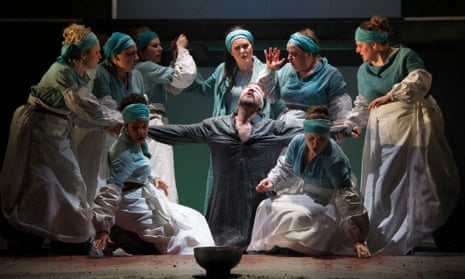James Conway’s English Touring Opera production of Iphigénie en Tauride opens with a group of women in butchers’ aprons hacking a man to pieces as his blood dribbles into a pit. Gluck’s masterpiece deals with the psychological consequences of self-perpetuating violence, and Conway refuses to prettify a work whose classical dramaturgy is frequently described in terms of lofty refinement. We’re reminded from the outset that Iphigénie herself presides, however unwillingly, over a cult of human sacrifice. Conway, unsparingly, allows us no room for complacency.
Thereafter, the brutality remains largely off-stage, as Gluck intended, though it reverberates through the drama as it unfolds, magnifying every emotional shift. The relationship between Grant Doyle’s half-crazed Orèste and John-Colyn Gyeantey’s Pylade is breathtakingly done, their love for each other transcending both the hell in which they find themselves and the greater nightmare in Orèste’s mind. Catherine Carby superbly registers Iphigénie’s fear of Craig Smith’s thuggish, xenophobic Thoas, and heart-rendingly delineates her growing empathy for the stranger she must kill, unaware that he is, in fact, her brother. A strand of religious imagery eventually creeps in. Doyle looks increasingly Christ-like as thoughts of redemptive self-sacrifice take hold. The deus ex machina finale, in which the goddess Diana is played by a child, hints ambivalently at a return to prelapsarian innocence.

Musically it’s terrific, though Smith was taxed in places by Thoas’s implacable tessitura on opening night. Carby sounds extraordinarily beautiful as her voice cleaves through Gluck’s soaring lines, and Doyle’s formidable declamation contrasts sharply with Gyeantey’s admirably lyrical restraint. Martin André conducts with fierce passion throughout. It’s a remarkable piece of music theatre that arouses pity and terror – as classical tragedy always should.

Comments (…)
Sign in or create your Guardian account to join the discussion